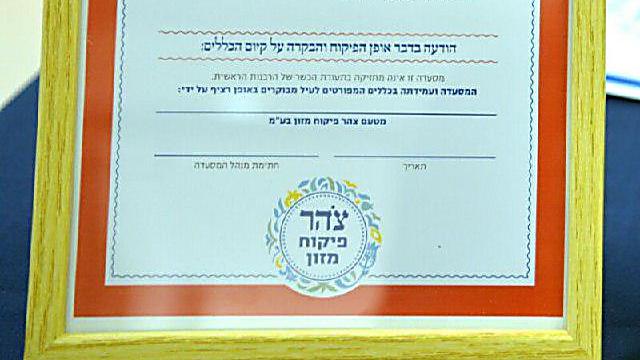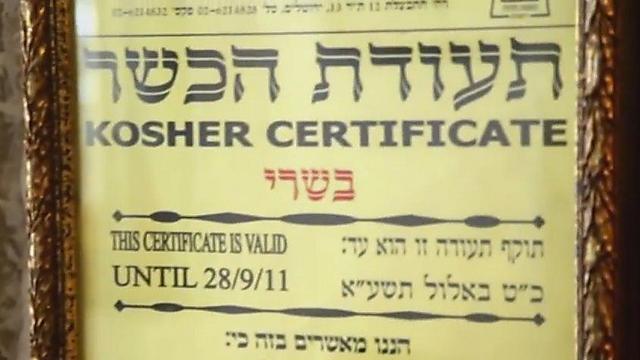
Tzohar launches independent kashrut supervision body
The religious-Zionist rabbinical organization launches a new kashrut supervising agency to compete with current Rabbinate's monopoly; it will employ women inspectors as well. Tzohar says it is not seeking to take away business from the Rabbinate and will offer equal pricing, but field 'must be competitive and transparent.'
The pragmatic religious Zionist rabbinic organization Tzohar announced this week that it is launching a kosher supervising entity that will compete with the Chief Rabbinate and offer the Israeli food industry an alternative supervision more convenient than that of the state.
Tzohar, which gained fame after pushing through a law that allowed couples to marry in any jurisdiction, set itself a goal of having 1,200 restaurants sign up for their new service within three years, which will make them the largest private kashrut organization in Israel.
“We are not trying to replace the Chief Rabbinate, but rather to challenge them," said Rabbi Rafi Feuerstein, who will lead the new kashrut body. "This was a difficult decision… We will do this free of criticism but rather by improvements. We will change the transparency of the pricing and the general rules, so that they will be clear and universal and not change from rabbi to rabbi and place to place. We will separate the supervisor from the supervised. We hope that in the wake of this, all kashrut supervision agencies will improve their system; that will be our pride.”
In recent years, in light of the disappointment of many business owners with the Rabbinate, and the criticism aimed at the Rabbinate's kashrut body by the courts as well as by the state comptroller, Tzohar considered entering the field to offer an alternative.
They hesitated though because of the complex legal framework: the law forbidding kashrut fraud. Until recently, the law was interpreted as forbidding a business from presenting itself as kosher, or even hinting as such, without an official certificate from the Chief Rabbinate.
The Hashgacha Pratit organization began offering low-priced supervision certificates a few years ago, first in Jerusalem then in other cities, raising the ire of the Rabbinate. Their model combined external supervision with trust of the business owner.
The Rabbinate imposed fines on some of those businesses, accusing them of fraud for claiming to be kosher. Two eateries took the case to the Supreme Court, claiming that the existing interpretation was too harsh and violated the freedom of commerce.
Half a year ago, the High Court partially accepted their argument and in an unprecedented decision ruled that businesses can claim that food is supervised according to Jewish law (Halacha) by a private body as long as they did not use the term kosher or any of its derivatives and proclaim that the certificate is unaffiliated with the local Rabbinate body.
The ruling opened the door to Hashgacha Pratit, a relatively small organization, and gave Tzohar the green light to enter the field as well, as a larger and more established organization.
The new body will be called “Tzohar Food Supervision” and businesses will assert that the food preparation was done according to kosher standards. Tzohar chose not to use terms that insinuate that halacha is followed in the establishment to stay away from further controversy.
A stately approach
The new initiative will act as a private company under the umbrella of Tzohar. Along with Rabbi Feuerstein, who is one of the founders of Tzohar, it will be headed by Rabbi Dr. Oren Duvdevani, who will be responsible for the halachic-professional aspects.
Dozens of kashrut supervisors, including women, will be employed by the new body; some of whom have already undergone training with the organization.
If Hashgacha Pratit operated on the border of legality and did not shy away from conflict with the Rabbinate, Tzohar will take a more cautious approach and maintain a more reserved and stately approach.
The goal of the new body will be to provide supervisory services mainly to businesses that do not currently hold a Rabbinate certificate, or those considering leaving it. The idea is to set standards that will be acceptable to centrists who keep kosher and not just to the more liberal oriented, who are already the target audience of Hashgacha Pratit.
Tzohar will offer services as well to businesses wishing to continue with the state (Rabbinate) kashrut agency, so that they will have two levels or variations of supervision, as is current practice with the Badatzim or Haredi supervising agencies.
Bypassing the Badatzim
In order to reach their goal of 1,200 businesses within three years and bypass Badatz Edah HacHareidis (currently the largest private agency), Tzohar will cooperate with Israel's Union of Restaurants from the start; its director Shai Berman was at their launch event.
Tzohar rabbis say that they believe in the importance of a central Chief Rabbinate, but the market monopoly needs to be broken. “The Rabbinate needs to be the regulator that sets the standards (not the sole provider). The market is already full of private Badatz kashrut agencies,” said Rabbi Feuerstein.
“We do not want to take from the Rabbinate, we want to add more businesses that are not kosher today. I am not naïve, and I know some will come over to us, but we will not attempt to take away the livelihood of others, rather that there should be an increase in kashrut in Israel,” he added.
The pricing is not expected to vary much from that of the Rabbinate's and therefore not be a major factor for crossing over. Tzohar says that at first the fees will be the same as the Rabbinate’s during the opening period, and perhaps be lowered at a later stage, when it reaches an economic balance. At first, they will serve only restaurants and eateries and only later move on to food manufacturing.
An important day for the Israeli economy
Shai Berman, Director of the Union of Restaurants, who isn't religious himself, was at the initiative’s launch event together with Tzoahr’s rabbis. He welcomed the new initiative, saying, “This is an important day for Israeli society. We are in favor of ‘bringing people’s hearts together,’ which this initiative will accomplish, and this is an important day for the Israeli economy, because we know that a monopoly is bad and we want alternatives."
“The field of kashrut will enjoy transparency and standardization. In any city, they will tell you the same thing. This will bring about lower fees and restaurateurs will know in advance what’s allowed and what isn't, allowing them to make more informed decisions that fit their needs,” he continued.
He called it the “beginning of a new era, where we are not afraid of one authoritative body that makes all the decisions. Now there will be choice. Until now, we had to dance according to the tune played (by the Rabbinate) and suffer from their terror. That situation has ended.”
One of the issues Tzohar is excited about is the participation of women as kashrut supervisors, a rarity in the Rabbinate.
“Religious women have broken ground in various fields of halacha… And we can offer our unique talents to the field of kashrut as well," said Idit Gottlieb, one of the supervisors.
Big potential
A market survey taken before the announcement by Tzohar showed the potential success of the new certification among consumers at restaurants and cafés. It found that 80 percent of Hebrew-speaking Israeli Jews (not including Haredim, who are not Tzohar’s target audience) expressed willingness to eat at places with the certificate; and 58 percent of those who are not kosher observant would prefer to patronize an establishment supervised by Tzohar than by others. Additionally, 51 percent responded that a certificate issued by the Rabbinate was untrustworthy in their eyes.
The poll was taken by C.I. Market Research for “Yahadut Kulanu,” founded by MK Elazar Stern (Yesh Atid) together with the Trigoboff Institute.
Stern praised Tzohar for its initiative and added that the current kashrut framework does not bestow pride upon Judaism. “It is about time there is a wide range of quality kashrut options that are user friendly and transparent, which can provide for all those who keep kosher and for businesses in Israel,” Stern said.
















